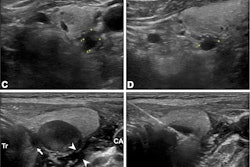Treating colorectal cancer patients with small liver metastases with thermal ablation is comparable to surgical resection, a study presented June 3 at the American Society of Clinical Oncology (ASCO) meeting found.
Using thermal ablation as the standard of care would benefit patients, presenter Martijn Ruben Meijerink, MD, PhD, from Amsterdam University Medical Center in the Netherlands, noted. Meijerink shared results from the Colorectal Liver Metastases: Surgery vs. Thermal Ablation (COLLISION) trial.
“Transitioning … to thermal ablation as standard of care for patients with small-size [≤ 3 cm] colorectal liver metastases would reduce complications, shorten hospital stay, and improve local control without compromising disease-free and overall survival,” he said.
There is growing evidence in favor of thermal ablation for treating cancer as opposed to the current standard of care, which is surgical resection. Previous research suggests that ablation can lead to a better safety profile, lower costs, and shorter hospital stays, while also being on par with surgical resection in terms of local control and overall survival.
Meijerink and co-authors explored the potential non-inferiority of thermal ablation compared to surgical resection for patients with small-size resectable colorectal liver metastases.
The phase III randomized-controlled clinical trial included data from 295 patients. Of these, 147 were assigned to thermal ablation while the remaining 148 were assigned to surgical resection. The researchers noted that the trial was stopped at halftime for having met predefined stopping rules.
After a median follow-up time of 28.8 months, the results showed no significant difference between the two methods in terms of overall survival, including a hazard ratio (HR) of 1.04 (p = 0.85) with a conditional probability of greater than 90%.
The team also found that procedure-related mortality and length of hospital stay favored thermal ablation.
| Comparison between thermal ablation, surgical resection | |||
|---|---|---|---|
| Resection |
Ablation |
p-value |
|
| Procedure-related mortality |
2.1% |
0% |
N/A |
| Length of hospital stay |
4 days |
1 day |
< 0.001 |
The researchers also reported that the total number of adverse events (p < 0.001) and local control (HR, 0.184; p = 0.03) also favored thermal ablation. Finally, the team found no differences regarding local (HR, 0.833; p = 0.53) and distant progression-free survival (HR, 0.982; p = 0.09).
The study drew praise from the Society of Interventional Radiology (SIR), which called it “tremendous news” for patients worldwide. SIR congratulated the researchers for their “groundbreaking” research.
“Interventional radiologists are uniquely suited to offer thermal ablation due to their extensive training in imaging, image-guided treatments, and clinical care,” SIR stated in a news release. “We hope the full data are published soon so we can operationalize this treatment in the field, move the standard of care forward, and give patients new hope for not just treatment but recovery.”
The results can be found here.



















